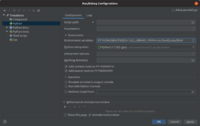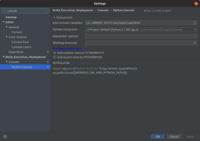CUDA: Difference between revisions
| Line 27: | Line 27: | ||
# Reboot. Check that GPUs are visible using the command: nvidia-smi | # Reboot. Check that GPUs are visible using the command: nvidia-smi | ||
# Install development and runtime libraries | # Install development and runtime libraries | ||
sudo apt-get install --no-install-recommends \ | sudo apt-get install --no-install-recommends \ | ||
cuda libcudnn7 libcudnn7-dev | cuda libcudnn7 libcudnn7-dev | ||
| Line 35: | Line 35: | ||
</syntaxhighlight> | </syntaxhighlight> | ||
For | For TensorFlow and PyTorch, you may need to add <code>LD_LIBRARY_PATH=/usr/local/cuda/lib64</code> to your environment variables.<br> | ||
You can also do this in PyCharm.<br> | You can also do this in PyCharm.<br> | ||
[[File:Pycharm LD LIBRARY PATH config.png| 200x200px]] | [[File:Pycharm LD LIBRARY PATH config.png| 200x200px]] | ||
Revision as of 05:23, 6 February 2021
Installation
Linux
- Install the latest nvidia drivers from the standard repo, e.g.
nvidia-drivers-450 - Install Cuda Toolkit separately without the drivers.
- Use one of the deb install options.
- For machine learning, you may also want to install the following:
- Adapted from Tensorflow: Install cuda with apt
# Add NVIDIA package repositories
wget https://developer.download.nvidia.com/compute/cuda/repos/ubuntu2004/x86_64/cuda-ubuntu2004.pin
sudo mv cuda-ubuntu2004.pin /etc/apt/preferences.d/cuda-repository-pin-600
sudo apt-key adv --fetch-keys https://developer.download.nvidia.com/compute/cuda/repos/ubuntu2004/x86_64/7fa2af80.pub
sudo add-apt-repository "deb https://developer.download.nvidia.com/compute/cuda/repos/ubuntu2004/x86_64/ /"
wget https://developer.download.nvidia.com/compute/machine-learning/repos/ubuntu2004/x86_64/nvidia-machine-learning-repo-ubuntu2004_1.0.0-1_amd64.deb
sudo apt install ./nvidia-machine-learning-repo-ubuntu2004_1.0.0-1_amd64.deb
sudo apt-get update
# Install NVIDIA driver
sudo apt-get install --no-install-recommends nvidia-driver-460
# Reboot. Check that GPUs are visible using the command: nvidia-smi
# Install development and runtime libraries
sudo apt-get install --no-install-recommends \
cuda libcudnn7 libcudnn7-dev
# Install TensorRT. Requires that libcudnn7 is installed above.
sudo apt-get install -y libnvinfer6 libnvinfer-dev libnvinfer-plugin6
For TensorFlow and PyTorch, you may need to add LD_LIBRARY_PATH=/usr/local/cuda/lib64 to your environment variables.
You can also do this in PyCharm.


GCC Versions
nvcc sometimes only supports older gcc/g++ versions.
To make it use those by default, create the following symlinks:
sudo ln -s /usr/bin/gcc-6 /usr/local/cuda/bin/gccsudo ln -s /usr/bin/g++-6 /usr/local/cuda/bin/g++
